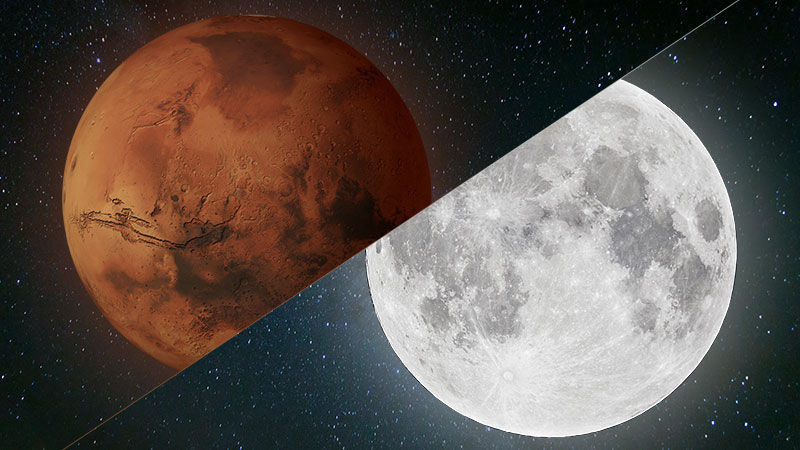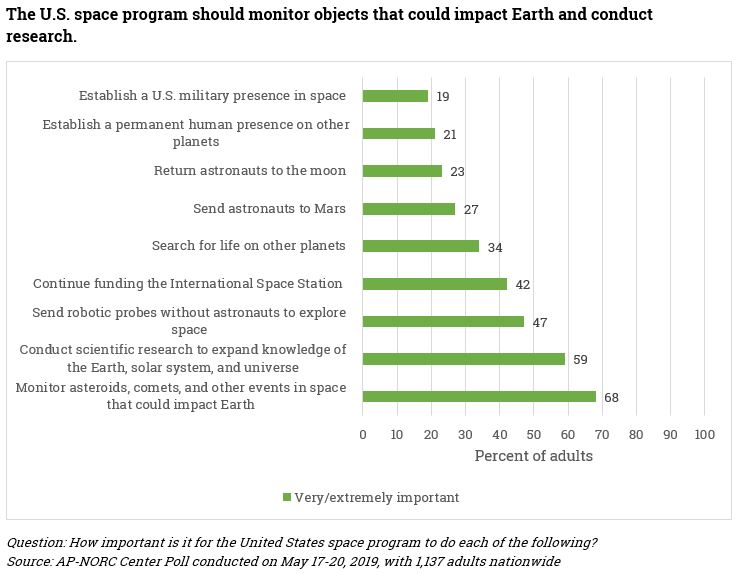
Nearly two years ago, Vice President Mike Pence made the administration’s space policy official, saying NASA would re-focus its program around “establishing a renewed American presence on the Moon, a vital strategic goal.” In December 2017, President Trump signed a space-policy document codifying this human-exploration plan.
Under this space-policy directive, a sustainable presence on the Moon would then become a stepping stone to destinations further out in space, such as Mars. The president recently made clear his preference for getting to Mars quickly, tweeting a few weeks ago: “For all of the money we are spending, NASA should NOT be talking about going to the Moon—we did that 50 years ago. They should be focused on the much bigger things we are doing, including Mars.”
A new poll suggests this talk about sending humans back to the Moon or on to Mars is out of step with the views of most Americans. The survey of 1,137 US. adults by The Associated Press-NORC Center for Public Affairs Research suggests only about one-in-four Americans believe sending humans to the Moon or Mars is “very” or “extremely” important.

AP-NORC poll results for is the following “extremely” or “very” important.
AN-NORC
By contrast, 59 percent of respondents found scientific research on Earth, the Solar System, and the universe to be very or extremely important for NASA. An even greater number, 68 percent, attached such importance to monitoring asteroids, comets, or other objects from space that could strike the planet.
These findings are consistent with a Pew Research Center survey from about a year ago, which found large majorities of the public much more interested in protecting the Earth’s climate and protecting the planet from asteroids than the human exploration of the Moon and Mars.
Lots of money, few results
So what is going on here? It has long—and correctly, we believe—been said the American support for space exploration is a mile wide and an inch deep. So Americans like the idea of a space program, and they appreciate robotic probes landing on Mars. But they don’t want to dig too deeply into their pockets to pay for it. (The public isn’t very well-informed about this, however, as most Americans seem to think NASA claims about one-quarter of the US budget. It is, in fact, less than one-half of one percent).
On some fundamental level, perhaps, Americans also realize that they haven’t exactly been getting high returns on their investments in human exploration—especially when it comes to deep space. During the last 15 years, for example, NASA has been engaged in building the “capabilities” for a deep-space exploration program (principally the Orion spacecraft and two large rockets, the Ares V and then the Space Launch System).
This has cost nearly $50 billion. And for what? None of these vehicles is yet ready for human spaceflight, and realistically, humans are unlikely to use them to fly into deep space before the early or mid-2020s.
The implications of these findings for the next president are intriguing. The Trump administration will likely continue the same, slow slog it appears to be on (promises of a 2024 lunar landing notwithstanding) that involves continuing to spend in excess of $3 billion annually on Orion and the SLS rocket. But a Democratic president might see the largesse in the NASA budget for deep-space exploration vehicles, observe the public’s preference for protecting Earth, and rearrange the budget accordingly.
Không có nhận xét nào:
Đăng nhận xét